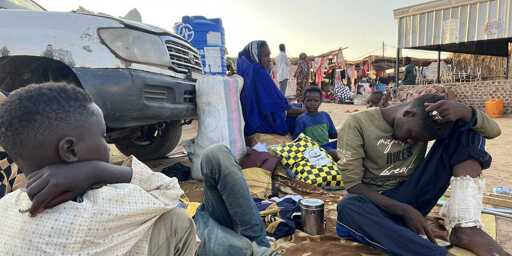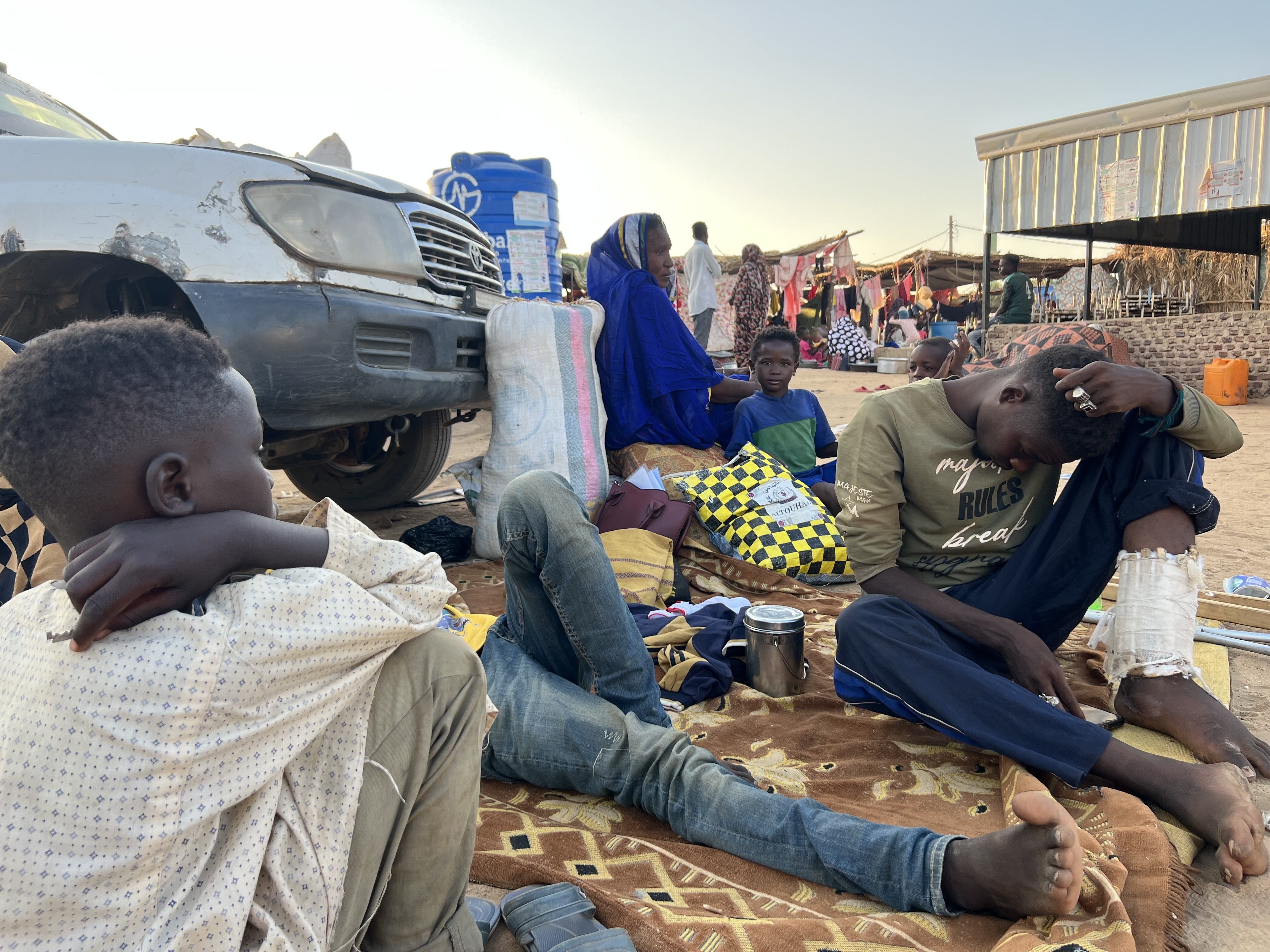We have a commitment to ensuring that our journalism is not locked behind a paywall. But the only way we can sustain this is through the voluntary support of our community of readers. If you are a free subscriber and you support our work, please consider upgrading to a paid subscription or gifting one to a friend or family member.
Tens of thousands of Sudanese have been displaced following the Rapid Support Forces takeover of El-Fasher, the capital of Sudan’s North Darfur state. Some have reached Al Dabbah in Sudan’s Northern State. November 1, 2025. Photo by Stringer/Anadolu via Getty Images)
Jawahir Adam barely made it out of El-Fasher alive. Adam, a 62-year-old woman from the Fur tribe, fled the city—which is the capital of North Darfur state in western Sudan—when the paramilitary Rapid Support Forces (RSF) violently seized it on October 26.
That morning, the northern gate of El-Fasher opened for the first time in months. The city had been under RSF siege for 18 months, starving residents, destroying entire neighborhoods, and triggering a famine. As RSF forces overran El-Fasher, driving the Sudanese Armed Forces (SAF) from its last remaining stronghold, Adam joined some 350 people—the majority of them women, children, the elderly, and wounded—heading to Tawila, a town west of El-Fasher, in search of safety.
By the time they reached Tawila two days later, the group of 350 had been reduced to just 130 people. Adam and other survivors recounted horrific scenes as they trekked through the desert, where they faced kidnapping, extortion, sexual violence, and ethnically targeted killings at the hands of the RSF.
“What happened to us is genocide on an ethnic basis,” Adam told Drop Site. The ethnic conflict in Darfur historically involved Sudanese government forces and allied Arab militias—the Janjaweed, which later became the RSF—against rebel groups and civilians from non-Arab African ethnic communities, specifically the Fur, Masalit, and Zaghawa. “Even in interrogations at the checkpoints they asked: What tribe are you? If you’re Zaghawa, or any non-Arab tribe, you’re counted among the dead.”
Immediately after the RSF took over El-Fasher, reports of mass atrocities began to emerge. Nearly 500 patients and their companions were reportedly killed in the Saudi Maternity Hospital alone, according to the UN, one of many health facilities that was targeted.
“Women and girls are being raped, people being mutilated and killed, with utter impunity. After overrunning the SAF’s last major stronghold in Darfur, RSF fighters moved house to house with credible reports of widespread executions as civilians attempted to escape,” said Tom Fletcher, the United Nations Under-Secretary-General for Humanitarian Affairs and Emergency Relief Coordinator, at a Security Council briefing on October 30.
On Monday, the world’s leading authority on food crises, the Integrated Food Security Phase Classification (IPC), said famine has spread to El-Fasher and the city of Kadugli in South Kordofan province—which has also been under RSF siege for months—with “a total collapse of livelihoods, starvation, extremely high levels of malnutrition, and death.”
According to the UN Fact-Finding Mission on Sudan, which gathered direct testimonies from survivors, there has been “a deliberate pattern of ethnically targeted executions of unarmed civilians, assaults, sexual violence, widespread looting and destruction of vital infrastructure, and mass forced displacement.”
Drop Site is reader-supported. Consider becoming a free or paid subscriber.
The Exodus
The war between the SAF and the RSF ignited in April 2023 with fighting in the capital of Khartoum and elsewhere across the country, plunging Sudan into a relentless conflict and sparking the world’s largest humanitarian crisis.
Adam ran a small restaurant in northern El-Fasher in the Abu Shok camp, where she had been displaced in 2015 from the south of the city as the fighting raged. She served traditional food and tea to her neighbors, including those who couldn’t afford to pay. It was her only income after her husband Yahya was killed in the war in 2015.
In early October, Adam was forced to move again after RSF forces breached the Abu Shok camp. Adam left with her daughter, three of her grandchildren, her niece Zaynab, and her nephew Yousuf—all carrying what they could. Her family was among the last to leave.
They initially sheltered in the relatively fortified neighborhood of Al Daraja Al Oula, where some armed leaders allied with the SAF lived. The homes there offered better protection from the barrage of RSF artillery falling across the city.
By late October, as the RSF moved in, the family, along with hundreds of others, made the decision to leave, first west toward a small village called Hillet Al-Sheikh, about seven kilometers from El-Fasher, then onward to Qurni, a town controlled by armed movements aligned with the RSF and part of the RSF’s parallel governance structure.
“We got water in Qurni and spent one night there, surrounded by the sound of gunfire all along the road,” Adam said. “At dawn on Monday, we moved at 4 a.m. toward Tawila. By 10 a.m., we saw corpses of men with emaciated bodies, they had died of hunger after more than 18 months of siege.”
On the road, RSF forces conducted widespread abuses: random gunfire, humiliating interrogations, and theft. Phones, jewelry, money, and anything of value was taken. Those deemed too old or too weak to continue were left behind.
Adam said the sexual violence was also systematic and public. “They were touching women’s genitals in front of their children, enjoying humiliating us,” Jawahir said. “I have never seen such provocation in my life.” She also witnessed soldiers, some who appeared no older than 16, telling an elderly man they had seen that “he had lived long enough” and they would “help him leave life comfortably.”
The International Organization for Migration estimated on Sunday that over 70,000 people have been displaced from El-Fasher since the RSF took control. Yet less than 6,000 have made it to Tawila, the nearest camp some 65 kilometers (40 miles) away, the Norwegian Refugee Council, which runs the camp, told the AP.
Initially, the RSF allowed some residents of El-Fasher to leave for Tawila. But, two days after seizing the city, the militia group accused all remaining civilians of being loyal to the SAF and prevented most residents from escaping. Videos circulating online show RSF fighters hunting down civilians as they flee, wounded or kneeling civilians being beaten and pleading with armed militiamen for their lives before being executed, trenches filled with bodies, and more.
Inside the city, the humanitarian situation is catastrophic. All those left in El-Fasher were ordered to remain in their homes. Hundreds were arrested and accused of supporting the army and its allies.
Susan Omar, a 29-year-old government employee, lived in the Awlad Al-Rif neighborhood in the south of the city. Omar is a pseudonym and she communicated to Drop Site through a messaging app on condition of anonymity out of fear of retaliation. She evacuated to the northern Al Daraja Al Oula neighborhood in September, and remained in the city to care for her elderly parents.
Omar was unable to check on her extended family until three days after the RSF seized control because most internet cafés had been shut down. When some reopened, they were operated by RSF members. She now lives in constant fear, without access to medicine or food. Gunfire rings out throughout the day, accompanied by the cries of hungry children.
“Since the war began in El-Fasher, we have not seen a single good day,” Omar wrote. “After the city fell, the streets filled with corpses and civilians faced field tribunals. What happened is beyond description in its brutality.”
The Siege Continues
With the takeover of El-Fasher, the months-long siege of the city has not ended, only transformed, according to Muhammad Bashara, a 33-year-old Sudanese human rights activist based in Paris and whose work is focused on the Darfur conflict. The RSF has been constructing earthen barriers around the city since August, covering approximately 70 kilometers (43 miles), with the explicit purpose of preventing residents of certain neighborhoods from leaving the city.
“The embankments existed before, but the RSF expanded and reinforced them to tighten the stranglehold on the city,” Bashara told Drop Site. He characterized this as part of what he described as “a genocide plan against El-Fasher’s residents.”
The massacres being committed have not distinguished between Black African tribes, Bashara noted, though the targeting has concentrated particularly on the Zaghawa, along with the Fur and Masalit groups, who previously survived genocidal assaults in Geneina in West Darfur in May and June 2024.
Amid mounting international outrage, Bashara said, the RSF began forcibly filming citizens, coercing them to state on camera that the city is safe and conditions are stable, a clear effort aimed at contradicting survivor accounts of mass killings. RSF leader Mohammed Hamdan Dagalo—known as Hemedti—also made a speech that was shared on social media and claimed to hold “any soldier or officer who committed a crime” responsible.
“Life in El-Fasher is nearly suspended,” Bashara said. “The situation today resembles the final days of fighting: no open markets, no movement in the streets. Fear pervades the population, and militias roam the roads”.
Tens of thousands of civilians remain trapped. Others fled, many on foot, without basic necessities, while humanitarian relief continues to be obstructed and denied.
“As El-Fasher burns and millions face starvation, the world must choose between silence or solidarity,” Mohamed Chande Othman, chair of the UN Fact-Finding Mission on Sudan, said in a statement. “Since the siege of El-Fasher and the surrounding camps, and following the RSF’s takeover of the city, the humanitarian crisis has deepened in real time. We must ensure that the cries of Sudan’s victims echo not into a void, but into action.”
This piece was published in collaboration with Egab.
From Drop Site News via this RSS feed



